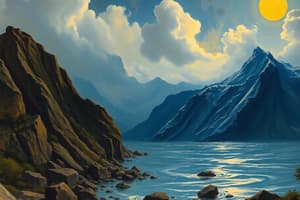Podcast
Questions and Answers
Approximately how old is Earth?
Approximately how old is Earth?
- 3.2 billion years (correct)
- 1.8 billion years
- 539 million years
- 720 million years
During which era did the Great Oxidation Event occur?
During which era did the Great Oxidation Event occur?
- Hadean
- 2.5 billion years ago (correct)
- Cambrian
- Carboniferous
When did the first Eukaryotic cells with a nucleus emerge?
When did the first Eukaryotic cells with a nucleus emerge?
- 1.6 billion years ago (correct)
- 720 million years ago
- 3.2 billion years ago
- 1.8 billion years ago
When did forests and lush marshlands reach their peak?
When did forests and lush marshlands reach their peak?
Around how long ago did Earth freeze over again?
Around how long ago did Earth freeze over again?
At what point in Earth's history did the supercontinent Columbia form?
At what point in Earth's history did the supercontinent Columbia form?
What characterized the Hadean eon in Earth's history?
What characterized the Hadean eon in Earth's history?
When did minerals called zircons suggest the presence of water on Earth?
When did minerals called zircons suggest the presence of water on Earth?
What led to the presence of oxygen in the atmosphere and a period of multiple ice ages?
What led to the presence of oxygen in the atmosphere and a period of multiple ice ages?
When did the supercontinent Columbia form?
When did the supercontinent Columbia form?
At what point did the first Eukaryotic cells with a nucleus emerge?
At what point did the first Eukaryotic cells with a nucleus emerge?
When did evidence of the first unicellular predators emerge?
When did evidence of the first unicellular predators emerge?
During which event did Earth freeze over again?
During which event did Earth freeze over again?
When did the multicellular organisms become widespread in the Cambrian explosion?
When did the multicellular organisms become widespread in the Cambrian explosion?
Flashcards are hidden until you start studying
Study Notes
- Earth is approximately 4.5 billion years old.
- The first eon of Earth's history is the Hadean, characterized by a molten surface and a CO2-dominated atmosphere.
- Around 90 million years into Earth's history, minerals called zircons suggest the presence of water.
- Earth experienced heavy asteroid bombardment during the first few hundred million years.
- Around 3.2 billion years ago, the era of continents began with the formation of tectonic plates.
- The Great Oxidation Event around 2.5 billion years ago led to the presence of oxygen in the atmosphere and a period of multiple ice ages.
- Around 1.8 billion years ago, the supercontinent Columbia formed and a natural nuclear reactor was discovered.
- Around 1.6 billion years ago, the first Eukaryotic cells with a nucleus emerged.
- Around 1.2 billion years ago, the first fungi-like organisms appeared and the Earth's crust began to solidify.
- Around 1.0 billion years ago, evidence of the first unicellular predators emerged.
- Around 720 million years ago, Earth froze over again and the supercontinent Gondwana formed.
- Around 539 million years ago, multicellular organisms became widespread in the Cambrian explosion.
- Around 359 million years ago, forests and lush marshlands were at their peak in the Carboniferous.
- Around 252 million years ago, the supercontinent Pangea formed and the largest mass extinction in history occurred.
- Around 66 million years ago, mammals took over and humans came later.
- The text is a summary of Earth's history from its formation to the present, including key events and the emergence of life.
- The text provides context and details about each era and event, including the geological conditions and the emergence of new species.
- The text also mentions the challenges faced by life throughout Earth's history and the importance of scientific discoveries in understanding the planet's past.
Studying That Suits You
Use AI to generate personalized quizzes and flashcards to suit your learning preferences.




